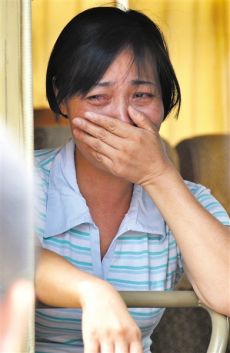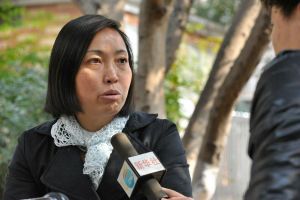Difference between revisions of "Petition Mother"
imported>Ciic |
imported>Ciic |
||
| (6 intermediate revisions by the same user not shown) | |||
| Line 1: | Line 1: | ||
| − | [[file: Tang Hui.JPEG|thumb| | + | [[file: Tang Hui.JPEG|thumb|230px|Tang Hui]] |
| − | '''Tang Hui''' (唐慧), a native of Yongzhou in [[Hunan Province]], was dubbed the “petition mother.” She was put in a labor and reeducation camp in 2012, after issuing multiple appeals for compensation in the court battle ensuing her daughter’s kidnapping and rape. She was sentenced to 18 months in the camp, but released after just eight days following a public outcry. | + | '''Tang Hui''' ('''唐慧'''), a native of Yongzhou in [[Hunan Province]], was dubbed the “petition mother.” Her appeals helped bring about the abolishment of the reeducation through labor program on November 15, 2013. |
| + | |||
| + | She was put in a labor and reeducation camp in 2012, after issuing multiple appeals for compensation in the court battle ensuing her daughter’s kidnapping and rape. She was sentenced to 18 months in the camp, but released after just eight days following a public outcry. | ||
On July 15, 2013, the Hunan Provincial Higher People's Court ruled during the final hearing that the Yongzhou City labor camp administration should pay the mother 2,941 yuan (US$490) in compensation. But Tang's request or an apology from the labor camp authority was not supported by the court. | On July 15, 2013, the Hunan Provincial Higher People's Court ruled during the final hearing that the Yongzhou City labor camp administration should pay the mother 2,941 yuan (US$490) in compensation. But Tang's request or an apology from the labor camp authority was not supported by the court. | ||
| + | |||
| + | Tang said she was currently applying for U.S. visas and would ideally set off in half a year. She did not reveal the source of her funds, but reiterated that curing her daughter was her biggest wish. | ||
Born in 1973, Tang has only finished primary school. In 2006, her 11-year-old daughter Le Le was abducted and taken to a brothel, where she was raped over 100 times in a period of merely three months, during which she was beaten severely when refusing to cooperate. Tang and several of her relatives rescued Le Le from the brothel, which was being operated under the disguise of an entertainment center. | Born in 1973, Tang has only finished primary school. In 2006, her 11-year-old daughter Le Le was abducted and taken to a brothel, where she was raped over 100 times in a period of merely three months, during which she was beaten severely when refusing to cooperate. Tang and several of her relatives rescued Le Le from the brothel, which was being operated under the disguise of an entertainment center. | ||
| Line 23: | Line 27: | ||
Tang has told Beijing Times that her daughter, who was suffering from incurable venereal disease and mental distress, was not in good shape. She hopes to bring the girl to Beijing to seek psychological counseling after the provincial court gives its final verdict. | Tang has told Beijing Times that her daughter, who was suffering from incurable venereal disease and mental distress, was not in good shape. She hopes to bring the girl to Beijing to seek psychological counseling after the provincial court gives its final verdict. | ||
| + | |||
| + | On June 12, 2014, the supreme court annulled the death penalty for two men convicted of the rape of her daughter. | ||
[[category: law]] | [[category: law]] | ||
[[category: Yongzhou People]] | [[category: Yongzhou People]] | ||
Latest revision as of 07:05, 12 June 2014
Tang Hui (唐慧), a native of Yongzhou in Hunan Province, was dubbed the “petition mother.” Her appeals helped bring about the abolishment of the reeducation through labor program on November 15, 2013.
She was put in a labor and reeducation camp in 2012, after issuing multiple appeals for compensation in the court battle ensuing her daughter’s kidnapping and rape. She was sentenced to 18 months in the camp, but released after just eight days following a public outcry.
On July 15, 2013, the Hunan Provincial Higher People's Court ruled during the final hearing that the Yongzhou City labor camp administration should pay the mother 2,941 yuan (US$490) in compensation. But Tang's request or an apology from the labor camp authority was not supported by the court.
Tang said she was currently applying for U.S. visas and would ideally set off in half a year. She did not reveal the source of her funds, but reiterated that curing her daughter was her biggest wish.
Born in 1973, Tang has only finished primary school. In 2006, her 11-year-old daughter Le Le was abducted and taken to a brothel, where she was raped over 100 times in a period of merely three months, during which she was beaten severely when refusing to cooperate. Tang and several of her relatives rescued Le Le from the brothel, which was being operated under the disguise of an entertainment center.
When her daughter regained her freedom, Tang started to sue the brothel and the local policemen under whose protection, Tang believes, the brothel operated.
In June 2008, the Yongzhou Intermediate People’s Court sentenced Qin Xing, who headed the underground gang in kidnapping girls and women for prostitution, to death; Zhou Junhui, who was in charge of the criminal organization and had kidnapped Le Le and raped the girl, was sentenced to death as well. The court also ordered the imprisonment of several criminals who had raped the girl. Nonetheless, both prosecutors and defendants appealed to the higher court.
The defendants thought the verdict was too grave for them, whereas the plaintiffs, represented by Tang, believed the court didn’t publish the full list of criminals, which included two local policemen who had raped her daughter. Moreover, it had not ordered any compensation for the victim and her family.
On June 5, 2012, the Hunan Provincial Higher People’s Court upheld the verdict which eventually caused Tang to continue her appeal. In August 2012, the Lingling branch of the Yongzhou Police Bureau ordered Tang to spend 18 months in a labor camp because the police branch deemed her petitions to harm social security. According to the Yongzhou Police Bureau, Tang had intercepted official police cars, got on her knees and shouted inside the police station.
On August 10, 2012, the Labor and Reeducation Committee annulled Tang’s penalty in consideration of her position as her distraught daughter’s custodian. Tang asked for compensation for her time spent in detention, but her request was refused by the Labor and Reeducation Committee.
On January 23, 2013, Tang sued the Labor and Reeducation Committee in the Yongzhou Intermediate People’s Court, asking for 1,463.85 yuan (US$237) in state compensation for the infringement upon her freedom, 1,000 yuan for the mental distress the detention caused and a written apology. Nevertheless, the court dismissed Tang’s case saying it had no supporting facts or laws.
Tang consequently appealed to the Hunan Provincial Higher People’s Court. The court started to hold hearings on July 2, 2013. According to Tang, the provincial court used to mediate the lawsuit between her and the Labor and Reeducation Committee by promising compensation and an oral apology from the committee, but Tang refused. She said she could not “receive money in the dark.”
Tang has told Beijing Times that her daughter, who was suffering from incurable venereal disease and mental distress, was not in good shape. She hopes to bring the girl to Beijing to seek psychological counseling after the provincial court gives its final verdict.
On June 12, 2014, the supreme court annulled the death penalty for two men convicted of the rape of her daughter.

